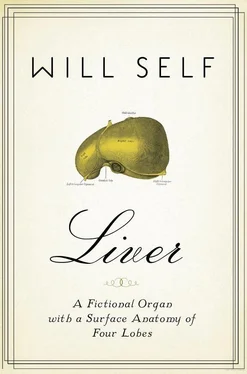‘Very well,’ she said. ‘ Sonntag it is.’ And went out into the street.
Where it was chilly, Joyce realized, with the approach of evening. Swiss sat suppering in the candlelit window of a restaurant opposite, the plump men correct in jackets and ties, their wives restrained by decent couture. From thirty feet away Joyce could still make out the food piled on their plates, and she felt the first quickening of an appetite long in abeyance. Pulling her coat tightly about her and buttoning it, she headed off uphill between the bright windows of the bijou luxury goods shops that took up the ground floors of the hunched houses.
Her saliva tasted sweet; the rumbling of her belly was unthreatening. Although she had forgotten an incontinence pad, Joyce felt no seepage or ominous swelling. The wire had been yanked out of her.
Leather goods as edible as milk chocolate; gold-nibbed fountain pens as suckable as teats; jewelled sweetmeats arranged on velvet-covered platters — Joyce gobbled it all up. She turned up a cobbled ramp, passed an inscribed Roman tablet set in a niche and reached a small hilltop park where linden trees with their first green tips stood in raised beds, and a water feature dribbled into a pool surrounded by empty benches. A low stone wall drew Joyce to it; from here she could look out over the old centre of Zürich. Close to, in the fading light, the twin domes of the Grossmünster, the tapered spire of the Fraumünster, all the other high-gabled buildings, with their steeply sloping roofs, weathercocks and gilded clock faces, jostled along the banks of the Limmat. The fog was lifting, scudding up as the darkness streamed down from the woods of the Zürichberg. In the suburban streets, the street lamps came on, braiding the trees. The Limmat unwound, a vinous ribbon between glassy embankments.
Joyce drank in Zürich’s peace and orderliness. The city gave her a curious sensation of dé ja` vu, as if it were a picture that she had stared at, sightlessly, in childhood: a reproduction of Hunters in the Snow on a classroom wall. The breeze was fresh, with a note of last year’s leaf fall. There was hardly any noise — no police sirens, no shouts, no traffic grumble, only the carillon of a distant tram.
Later, as she made her way back to the hotel, Joyce passed by the open door of a small Catholic chapel. A young priest, closing up for the night, was ushering out two late worshippers; his face was chubby, although his soutane hung loose on his rail-thin body. The sparse blond hairs on his bare head caught the light shining from behind the altarpiece, which was an undistinguished modern diptych: the Virgin Mary on one side, a frumpy mummy in a magenta housecoat; Jesus on the other, not a baby any more , and really of an age when he should be expected to dress himself .
The young priest said ‘ Guten Abend ’ to Joyce, and she said ‘ Guten Abend ’ back.
Hearing her accent, the couple, who had been hurrying off, stopped, and the man turned. He was middle aged and solidly built; when he came back into the light, Joyce saw that his otter head was sleek with dark-chocolate hair; he also had a rounded oblong moustache that was less groomed. It demanded, Joyce thought, to be waxed. He wore an Inverness-style coat, the cape fur trimmed. On most men this would have been an affectation , but, as he approached, Joyce saw that, somehow, he could carry it off.
‘You are’, the man said, ‘English?’
‘Yes.’
‘If you were looking for a Catholic place of worship, I am sorry that this is only a shrine, joined now with the Benedictine monastery at Einsiedeln.’
‘I’m not — ’
The man rode over her denial; he was gently slapping the palm of his left hand with the gloves he held in his right, an insistent accompaniment to the information he had to convey. ‘Father Grappelli und I’ — he submerged his otter head; the priest smiled and half bowed, thumbs hooked in the cord at his waist — ‘we are the committee people of the old parish here, we look after the restorations and these things.’
Joyce glanced at the man’s female companion, expecting a complicit look, but the woman, whose features were pinched under tight curls, only stared back blankly.
Joyce tried again: ‘I’m not a Catholic.’
‘So, so’ — the zealot wouldn’t let her off the hook — ‘but if you were wanting to be’ — the moustache quivered — ‘or are only needing the comfort of an English-language service during your stay, then Father Grappelli is one of the — ein offiziants at St Anton’s in Minervastrasse. We’ — he indicated the woman — ‘are communicants there also.’
‘P-Please.’ Joyce held up a hand; she thought she was annoyed, but discovered that her voice bubbled with merriment. The priest and the cold woman chuckle-coughed Schweizerdeutsch over each other. Joyce assumed they were telling the natty man to rein it in .
‘Please,’ the man echoed Joyce, ‘that is enough of it now, Guten Abend , we are hoping to see you there.’ He took the woman by the upper arm and escorted her away.
Joyce turned to the young priest, expecting him to say something — the scene seemed to demand it — but he only added his own Guten Abend and retreated inside the chapel.
Later still, Joyce sat on the sofa in her hotel room. She snapped off a spun-sugar span from the stylish confection that had sat on the coffee table since her arrival. Then, reaching inside the sickly cage, she took a white chocolate truffle.
Chocolate.
While the bonbon melted in her mouth, Joyce reflected on her odd journey; from one chocolate to another, from Bournville to here, to the Gertrudstrasse suicide flat, and now back here again. At every stop there had been a sweet treat.
After two more truffles Joyce dialled Isobel’s room. There was no answer. She called reception: ‘My daughter — Fräulein Beddoes — has she gone out?’
‘She has checked out, madam, this evening at 17.00 hours, approximately.’
‘Was it? Did she — did she leave a message?’
‘Yes, madam, there is a letter here for you. Would you like me to send it up?’
Hoping this was generous, Joyce tipped the bellboy ten francs. She might need an ally. He smiled and bobbed his pillbox hat, but by no means obsequiously. Was it her imagination, or was there a certain brusqueness about everyone she had encountered since she had refused Dr Hohl’s cup full of poison? An absence of the patronizing manner the living had towards those feckless enough to be dying; a manner that implied they were the parents of teenagers embarking on a permanent holiday, with very little luggage and inadequate preparation.
Joyce didn’t open the envelope immediately. Instead, she lay on the bed, which had been remade and turned down while she was out. She picked up the aluminium stick and prodded the flat-screen TV into life. Trevor Howard materialized, saying: ‘Go home, Martins, like a sensible chap. You don’t know what you’re mixing in, get the next plane.’
But Joseph Cotten demurred, ‘As soon as I get to the bottom of this, I’ll get the next plane.’
Trevor Howard gave a tough, realist’s grimace — all the more commanding, given his homely features and bat ears. ‘Death’s at the bottom of everything, Martins,’ he clipped. ‘Leave death to the professionals.’
Joyce shifted on the fresh white pillows, curling up her legs, resting on one shoulder and an arm — it was a posture she hadn’t assumed in months. She opened the small box of chocolates the maid had left on the other pillow.
The Snow Hill Gaumont, the cigarette smoke thicker in the gloom than the Vaseline smeared on the lens when Alida Valli was in shot. Whatever happened to her? Clattering down alleys between ruined houses, scrambling over mounds of rubble, splashing through the cavernous sewers — there went the past in its square-cut suit. Then they were on the Ferris wheel, and Orson Welles — such a spendthrift with his talent, in the way that Death was a waster of human lives — was saying: ‘In Switzerland they had brotherly love, they had five hundred years of democracy and peace, and what did that produce? The cuckoo clock.’
Читать дальше












